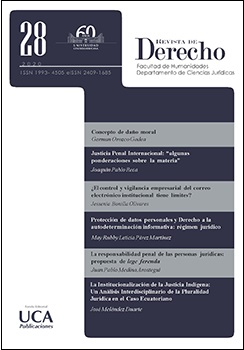Does the business control and surveillance have limits over the institutional email?
DOI:
https://doi.org/10.5377/derecho.v0i28.10145Keywords:
Nonspecific labor rights, business address, freedom of business, institutional emailAbstract
Human and fundamental rights represent a limit to power, but at the same time these can be limited or limited, as established in the Political Constitution or by the judicial system when faced with a collision of nonspecific fundamental rights. In this situation, according to the court's decision, it could apply either the principle of proportionality, the hierarchy of rights or “preferred liberties” or the ius fundamentality in attention, the latter, to connect a fundamental right such as private property with the freedom of company. In this article, it is proposed that the employer establish in advance the clear rules on the use of institutional email, the way in which it will carry out the control, the disciplinary measures, proportionate to the infraction, that it will take in the event of non-compliance with the established and of course that previously the workers know the rules. In this case, both parties to the employment relationship have their rights limited pursuant to the principle of proportionality. Freedom of business in Nicaragua is not a fundamental right or a human right, it is only a constitutional right. Institutional email is an intangible asset of the company and a resource or tool for technological work. The power of management of the employer arises from the Political Constitution and the Labor Code and it is these that limit its performance. The same Political Constitution, established an absolute law reserve both for the freedom of business and the right of private property.
Downloads
685
Downloads
Published
How to Cite
Issue
Section
License
© Copyright Universidad Centroamericana (UCA)
The author undertakes not to submit any article to any other journal or publication simultaneously.The content of the research article is the sole responsibility of the author, as a result, the Law Journal is released from any responsibility derived from the content of the work.
The author assigns the Revista de Derecho, the right to publish the article, distribute it and market it in the way he considers convenient, nationally and internationally, in printed and electronic format;as well as its inclusion in directories, bibliographic bases and international indexes.

This work is licensed under a licencia de Creative Commons Reconocimiento-NoComercial-CompartirIgual 4.0.




